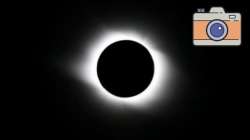Solar Eclipse on June 21: How to click pictures from your smartphone
Solar Eclipse is taking place on June 21 and will be visible from parts of India. Here's how you can capture the moment using your smartphone's camera.

Solar Eclipse on June 21, 2020: This year’s annular solar eclipse is set to take place on Sunday, June 21. According to the website TimeAndDate.com, the Surya Grahan will be visible from parts of India along with other regions of the world. The solar eclipse will start to appear at 9:15 AM IST and will reach its peak at around 12:10 PM IST. During this time, people will be able to witness a "ring of fire" in the sky.
When the term "ring of fire" comes in, it already excites most of us. While some of us just want to see it in action, there are a lot of people who would like to capture it. Smartphone cameras have advanced so much that even they can be used to get, if not exceptional, at least a usable shot for social media.
In case you are one of them, here’s what you need to follow in order to get the best shot possible.
Before heading over to the camera app on your phone, you must go through a list of safety measures. These measures are very important to protect yourself from the harmful rays that the Sun will emit during the eclipse.
Safety Measures
- Do not look at the sun with your naked eyes. This can result in damage to your eyesight or even bring complete blindness.
- In order to protect your eyes, wear certified solar viewing glasses when viewing the sun before, during and after an eclipse.
- Do not look at the sun through your digital camera’s viewfinder. Instead, look at the display to have a glance at what you are capturing. On smartphones, you are safe since you only have the display to look at.
How to click pictures using your smartphone
- Practice clicking pictures of the moon to get an idea on how your phone’s camera works.
- When clicking pictures using a smartphone, try using a tripod to get the most stability. Also, when you zoom a lot, the image tends to get shaky. To avoid shaky images, a tripod is highly recommended.
- Do not rely on autofocus as most smartphones will not be able to properly focus on the sun. Tap on the object, which is Sun in this case, and your phone should be able to focus better.
- Reduce exposure. Most smartphones allow this by simply sliding your finger downwards. This will reduce the amount of light your camera sensor is taking in and as a result, your phone will be able to capture a much detailed shot.
- Digital Zoom can bring grain to your pictures. In order to avoid this, use DSLR cameras with good zoom capabilities. Alternatively, you can use zoom lens attachments on your phone.
- Try using a timer of at least 5 seconds. Once you tap the shutter button, the 5-second gap will allow your phone to get a more stable shot.

